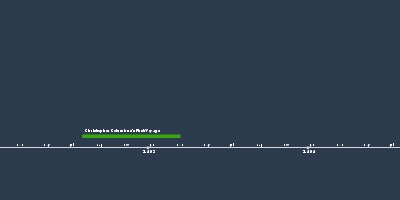Christopher Columbus (aug 3, 1492 – nov 7, 1504)
Description:
On August 3, 1492, Columbus set sail from Spain to find an all-water route to Asia. On October 12, more than two months later, Columbus landed on an island in the Bahamas that he called San Salvador; the natives called it Guanahani. For nearly five months, Columbus explored the Caribbean, particularly the islands of Juana (Cuba) and Hispaniola (Santo Domingo), before returning to Spain. He left thirty-nine men to build a settlement called La Navidad in present-day Haiti. He also kidnapped several Native Americans (between ten and twenty-five) to take back to Spain—only eight survived. Columbus brought back small amounts of gold as well as native birds and plants to show the richness of the continent he believed to be Asia.1493–96: Second Voyage
Departing Spain in September 1493, Columbus leads at least 17 ships back to the Americas. He returns to Hispaniola, explores other Caribbean islands, and founds several cities. In 1494 Spain and Portugal sign the Treaty of Tordesillas, dividing the Western Hemisphere between them. Columbus leaves his two brothers in charge of the settlements on Hispaniola and returns to Spain in 1496, still convinced he has reached the Far East.
Wars with France reduce Spain’s support for Columbus, and he sets sail with only six ships for his third voyage. He stops at Trinidad and later explores some of northern South America. However, in Hispaniola he and his brothers antagonize indigenous chiefs and Spanish settlers. Allegations of poor administration lead to Columbus and his brothers being returned to Spain in chains.
Columbus, though ill, embarks from Spain on May 9, 1502, for his final voyage. Forbidden to enter Hispaniola, he sails southward to Jamaica, Honduras, Nicaragua, and Panama. He fails to find either a strait to India or treasures he has promised Ferdinand and Isabella. Rescued from shipwreck, the navigator returns to Spain in 1504, embittered by his many disappointments.
Added to timeline:
Date:
aug 3, 1492
nov 7, 1504
~ 12 years
